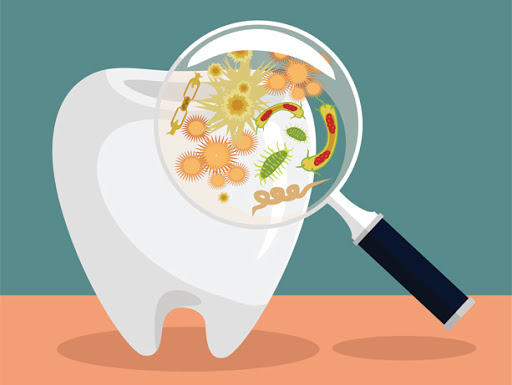
Your oral health has a major effect on the overall health of your body, not just in your mouth. By maintaining healthy teeth and gums, you can make your body healthier from head to toe.
Bacteria in the mouth cause tooth decay – by feeding on the sugars in the foods and drinks we consume – they leave behind the waste, in the form of a biofilm known as dental plaque.
Our mouths have lots of bacteria that is usually harmless. (Did you know that the bacteria in our body aids with digestion and other biological tasks?) However, if you do not brush or floss regularly, oral bacteria can reach dangerously high levels. When this happens, tooth decay, gum disease, and oral infections can be the nasty result.
Related Article: Dental Health for Seniors: Top 5 Dental Health Risks for Your Teeth
There is evidence that the oral bacteria and high level of inflammation associated with the serious gum disease known as periodontitis can play a role in diseases in other parts of the body.
The following health issues and diseases are linked with poor gum health:
There are researchers who suggest that heart disease, stroke and clogged arteries are linked to the inflammation and infections caused by too much oral bacteria.
In some rare instances, severe tooth decay can lead to an abscess. The infection can travel to the heart, brain, or lungs, causing severe illness or even death.
This is an infection of the inner lining of the heart. This can occur when bacteria from other parts of your body, such as your mouth, move through your bloodstream and become attached to damaged areas in the heart.
Severe gum infection has been linked to premature births and low birth weight.
Did you know that 85% of Americans suffer from gum disease, yet only 60% of those infected know they have gum disease? Gum disease is an infection of the tissues and bone that support your teeth and is the leading cause of tooth loss. However, the impact can extend beyond your mouth.
Also known as periodontitis, gum disease can significantly affect your general health.
Research shows that there is a connection between gum disease and other serious conditions such as:
If you have one of these systemic conditions, it is important to talk to your dentist about your risk for gum disease and the best treatment options.
Sometimes there are no signs of gum disease, which is why it’s essential to visit your dentist every six months for a checkup.
Gum Disease Treament
The three goals of Gum Disease Treatment involve:
Initial treatment options can include Laser Pocket Disinfection or scaling and root planning (also known as deep cleaning). There are surgery options for advanced gum disease.
Related Article: Gum Disease Explained: Signs, Symptoms and Treatments
By protecting the health of your teeth and gums, you can keep yourself healthier too. Practice good oral hygiene daily to prevent overgrowth of oral bacteria.
This includes:
You should also have regular dental checkups and cleanings. If you notice a problem with your teeth or gums, call for an appointment right away. The sooner these are handled, the sooner you will be back to full health. Travis Roberts, DDS provides general and family dentistry in the Kansas City, Kansas area to keep his patients healthy – including healthy teeth, healthy gums, and a healthy body. Time for your checkup? Call to schedule today.
Local dentist, Travis A. Roberts and his experienced, friendly team at Adams Dental Group offer affordable family dentistry and gentle dental care in the Kansas City, KS area. We have two locations that are conveniently located and offer appointment times Monday through Friday to meet your needs. At Adams Dental Group, we provide most dental services, from family and general dentistry to specialty procedures, including dental implants, dentures, endodontic or root canal treatment, teeth whitening, cosmetic dentistry and much more. We accept most dental insurance plans and offer affordable financial solutions for any budget. Call us at our West location (913) 296-8030 to schedule an appointment.
Dr. Travis A. Roberts, DDS May 26th, 2020
Posted In: Periodontal | Gum Disease
Tags: dental exam, diabetes and oral health, gum disease, oral hygiene, periodontal disease